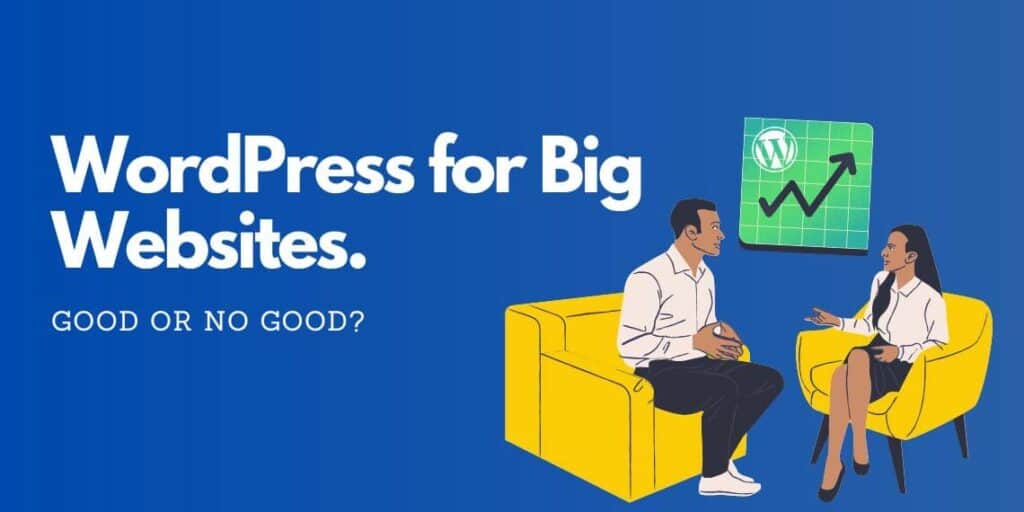WordPress is one of the most popular content management systems (CMS) for websites available today. It powers over 43% of all websites in the world, making it the most widely-used CMS available. The platform has been around for over 20 years. In that time, WordPress has developed a respectable reputation. The platform is constantly updated with new features and security enhancements. And the user interface has remained easy and intuitive.
WordPress took the web development world by storm, partly thanks to its flexibility, user-friendliness, and large community. The term “WordPress” has almost become synonymous with websites in general. If you are planning on building a new site or redesigning an existing site, you might be wondering if WordPress is right for your needs.
This question is even more relevant if your website is big in terms of (expected) visitors or resources. Would WordPress be a good choice for big websites as well? This guide discusses five important factors in the context of WordPress for big websites. These are Flexibility, Scalability, Security & Reliability, User-Friendliness, and Affordability. But first, let’s take a look at a couple of other websites.
Do Many Big Websites Use WordPress?
WordPress is by far the most used system in the world to create websites. Some of the biggest brands, celebrities, and governmental institutions trust WordPress to power their websites. Some of the impressive examples are The White House, Microsoft News, The Walt Disney Company, Sony Music, TechCrunch, Katy Perry, Time Magazine, Facebook Newsroom, and Vogue. That is just the tip of the iceberg.
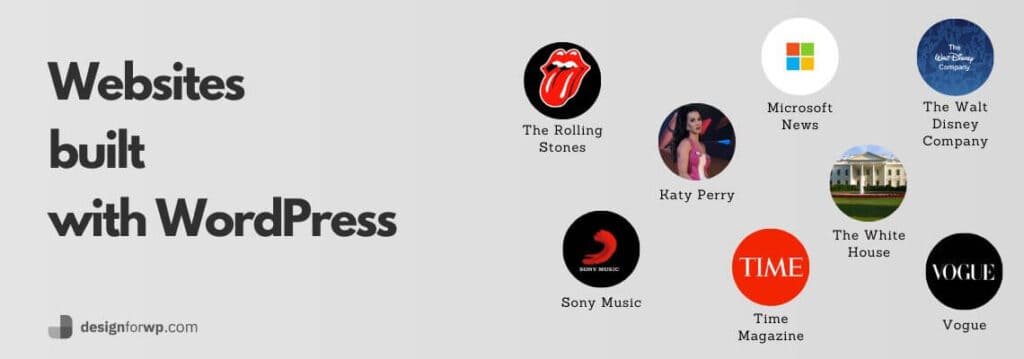
These examples show how diverse WordPress-based websites are. It ranges from big corporates to world-famous artists. And from websites in need of very high levels of security to websites serving the most-visited news articles in the world.
| Website | Est. monthly traffic |
|---|---|
| vogue.com | 14.2 million |
| techcrunch.com | 13.7 million |
| whitehouse.gov | 10.2 million |
| news.microsoft.com | 2.2 million |
| thewaltdisneycompany.com | 1.3 million |
WordPress works great for big websites. Whether it works for you too comes down to the specific needs you have.
We will continue this article with five important factors to consider before you choose any type of web platform. We will talk about how WordPress ranks across those factors. We will see that it does quite well, and why WordPress is used by creators, developers, and agencies to develop websites of any size.
Flexibility
WordPress is an open-source platform. This means that its core code is public and accessible to everyone. The standard version of WordPress is called the ‘WordPress Core’. It includes all the standard functionality you would expect of a content management system. You can extend this functionality by installing extensions, which in WordPress are called plugins and themes. With the right setup, you can build a site exactly the way you want.
WordPress is written in PHP, a scripting language for web servers. A MySQL database is used to store data. Millions of developers worldwide have extensive experience writing code in these languages. Throughout the years, developers made over 55.000 plugins and 32.000 themes and offered those either for download or sale. And on top of that, of course, people can develop custom-built plugins or themes. If you need a custom feature, you can build this by coding your own custom solutions.
WordPress website = WordPress Core + theme + plugins + custom code
All these available themes and plugins, as well as the open-source nature of WordPress, give endless possibilities to build websites of any type.
This makes WordPress extremely versatile and flexible. Whether you need a full-scale eCommerce website or a ticketing system; it can all be achieved through WordPress. What you need is the WordPress core together with any desired extension. It is the reason many choose WordPress for their own websites or websites of their clients.
Scalability
WordPress has been used on huge and complex sites. As we saw, there is enough evidence of websites with multimillion traffic a month running on WordPress. You can adjust the sizing of WordPress at any time to meet your needs.
It is important to realize that WordPress is very scalable, but that does not mean every WordPress website is scalable. To achieve a scalable website with good performance, a couple of things are important:
- a lightweight, optimized theme and plugins with high-quality code.
- a low number of plugins.
- WordPress stripped down to its essentials.
- reduced webpage sizes, in particular images (using tools like ShortPixel).
- a hosting provider with high-quality, well-configured servers.
- the use of caching, compression, and a CDN.
The bigger your website becomes, the more important each aspect is. The speed of your website increases tremendously by making the right choices. This allows you to scale your WordPress website to very high levels of traffic over time.
WordPress is very scalable, but not every WordPress website is scalable.
Choosing the right hosting provider is essential for this. Lots of hosting providers offer optimized solutions tailored to WordPress. For small websites, shared hosting is often sufficient. But bigger websites need optimized, dedicated hosting or cloud hosting. High-end hosting providers such as Kinsta offer these types of solutions. You can scale up your plan as your website becomes larger and larger.
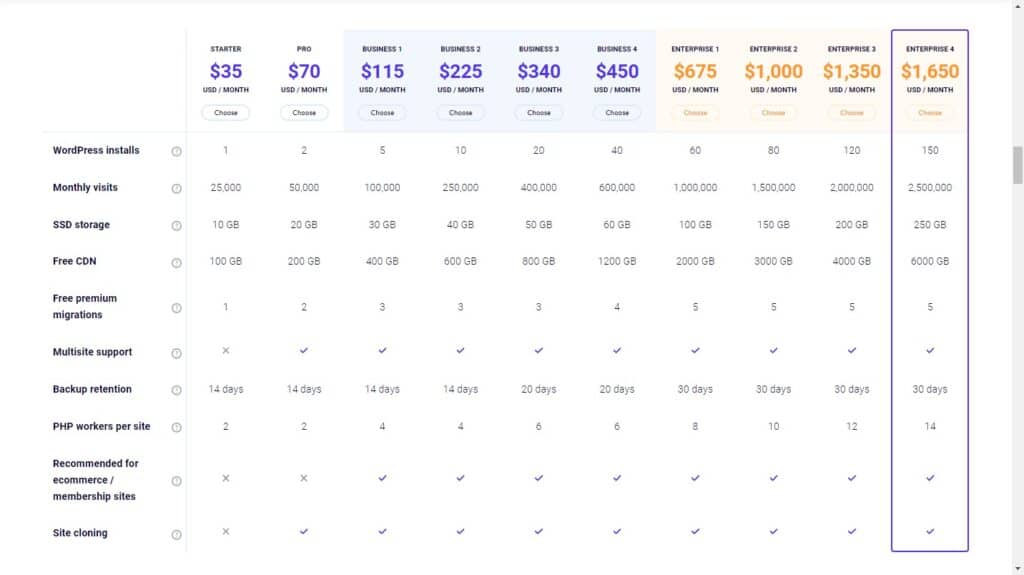
Another way to increase your website speed is by using a Content Delivery Network (CDN). This is a network of remote servers around the world, which all save copies of your site. Depending on where in the world a visitor opens up your website, the CDN will pick a server closest to them. It then serves a copy from that location to speed up response times. Premium hosting providers usually offer custom CDN solutions.
Whether WordPress is the right choice for your website depends on your wishes. You do not have to be concerned about WordPress’ capabilities of managing big websites with lots of traffic and resources. WordPress is certainly able of handling that. If high-speed performance is essential to you, you could also consider building a website from scratch. Nothing will beat the performance of an optimized self-built solution.
Security and Reliability
Security is an essential topic for any website. Even more so for large-scale websites. Over the years, many enterprise websites were victims of cyber-attacks and hacking attempts. No website is 100% safe and unfortunately, WordPress-based websites are no exception.
Security applies to a broad range of levels. Security breaches and vulnerabilities apply to these as well. Think about the following:
- WordPress Core
- Installed plugins
- Installed themes
- Hosting server
- Email server
- PHP
Security is important on all these levels (and there are more). It is, for example, a reason to choose a respectable, secure hosting provider. But the first three levels are in particular important to WordPress itself.
The WordPress Core
The WordPress Core is the backbone of any WordPress-based website. It is rarely subject to a security breach. Throughout the years, it got tested over and over again. And although security patches were needed every now and then, they didn’t cause major problems to live websites.
WordPress has a large community with an interest in making it secure and improving it. The community is made up of security experts and developers who constantly update the platform’s open-source code to make it safer. When they discover a vulnerability, if any, it gets fixed and patched through WordPress’ automated update system.
Plugins and Themes
The big problem is not the WordPress Core. It is that most websites have external themes and plugins installed. These are much more often the reason for security leaks. Often, they haven’t been thoroughly tested and reviewed. If any vulnerability is discovered in those, it causes immediate problems for any WordPress website with that particular extension installed.
This makes it very important to evaluate each external plugin and theme before adding it to a WordPress website. You often need to find a balance between building your own plugins or spending time finding secure external plugins. Evaluating it again after updates are rolled out is important as well.
Having your own custom-built plugins comes with its own risk as well. With popular plugins, there is often a community of developers actively evaluating quality and security. But custom-built plugins obviously only have you or your developer.
In general, we can say with confidence that WordPress is a secure system for any big large-scale website. The chances of security problems are significantly lower than almost any other web platform out there. But it is critical that you keep WordPress up to date and carefully review external plugins and themes before installing those.
Human Behaviour
Until now, we have only touched upon security on a technical level. Security relates very much to human behavior as well. Poor user passwords and wrong account roles are just two examples of how websites can become insecure.
These issues are not limited to WordPress websites. Fortunately, WordPress has built-in functionality to avoid these types of basic security issues. It generates strong passwords, has different kinds of user roles, and more. There are also many security plugins available that offer security analysis and extra levels of protection. Two of the many available security plugins are Sucuri and iThemes.
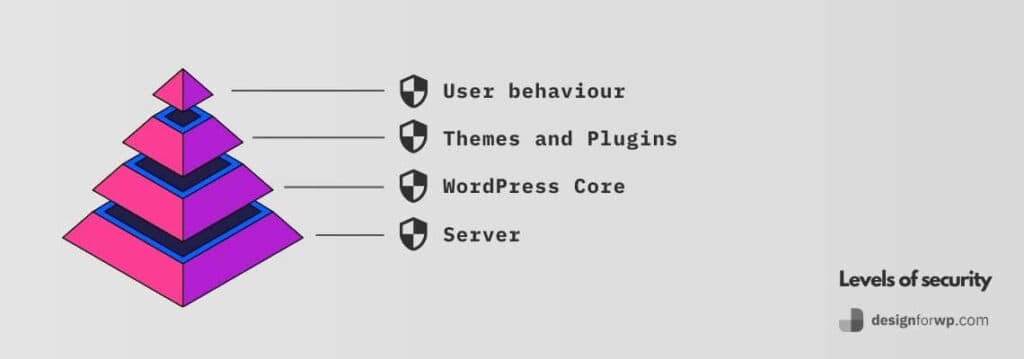
We have discussed WordPress and security. Regarding the reliability of WordPress websites, we can draw a similar conclusion. In essence, the WordPress core is extremely reliable and has never caused trouble for live websites. Websites become less reliable when using low-quality code or poorly configured servers. This is why it is so important to choose a high-quality hosting provider, themes, and plugins.
To conclude, most problems around security and reliability happen around any website. WordPress is no exception, but there are good reasons you are better of with WordPress compared to other web platforms.
User-Friendliness
The user-friendliness of a system is an often-overlooked aspect. User-friendliness does not only apply to your visitors. It applies to users working on the backend systems as well. Think of administrators, editors, or authors. Systems with unclear interfaces and bad user experiences will result in unwanted complications. Some examples are:
- Frustrated users
- Waste of time
- Higher chances of mistakes
- Reduced security
Nothing is more frustrating than spending hours on things that don’t work. You should, therefore, always consider the user-friendliness of a system.
WordPress offers a simple and intuitive user interface (UI) which makes it easy to use for beginners and experts alike. It is specifically built to make managing websites easy. You can build and edit websites without having to touch any code. Pages and posts can be set up through user-friendly drag-and-drop editors.
In terms of user-friendliness, there are no platforms that offer a better experience to their users. WordPress does a great job of keeping everything straightforward and easy to manage. Especially when you take into account its scalability and flexibility. WordPress is an excellent choice for big websites in terms of user-friendliness, as long as it is properly set up.
Affordability
WordPress is an open-source platform and free to download. This means you can start using it immediately without having to pay anything at all. Besides hosting costs, which any website requires, you don’t need any other costs. Usually, you would spend a small sum of money on themes and plugins. Those costs vary depending on your needs and can be anything from $€50 for small websites to several thousand for big websites. The majority of your costs would go to the development of the website itself.
One of the advantages of WordPress being an open-source platform are the low costs. If you would choose a platform that is created by a private company, you will get locked into a solution with yearly subscriptions and much less flexibility. And those costs might increase whenever the company decides it is time to higher those.
Let’s break down the costs for a WordPress website.
Domain and Hosting
Every single website needs a domain and hosting. These types of costs apply to every website and are not specifically for WordPress.
Depending on the size of a website, hosting can be between a few dollars or euros per year to a few thousand. Server costs are primarily defined by the number of computing resources, bandwidth, and storage required. The bigger your website, the higher those costs are.
Premium Plugins
WordPress plugins add great functionality to your website. Especially popular plugins save you tons of time – thus money. These plugins usually have a basic free version and offer bigger plans through one-time payments or yearly subscriptions.
Some plugins are almost essential to have. They add functionality around caching and security. Other plugins are useful if you are looking for specific functionality. Two examples are WPML (WordPress MultiLanguage) for multilingual websites and WPForms to create high-quality forms.
Depending on what you are looking for, these types of plugins could cost anywhere between a few dollars or euros a year to several hundred. But, they save you a lot of time compared to if you had to build them yourself. They are a great reason why WordPress is much more affordable than other systems or when built from scratch.
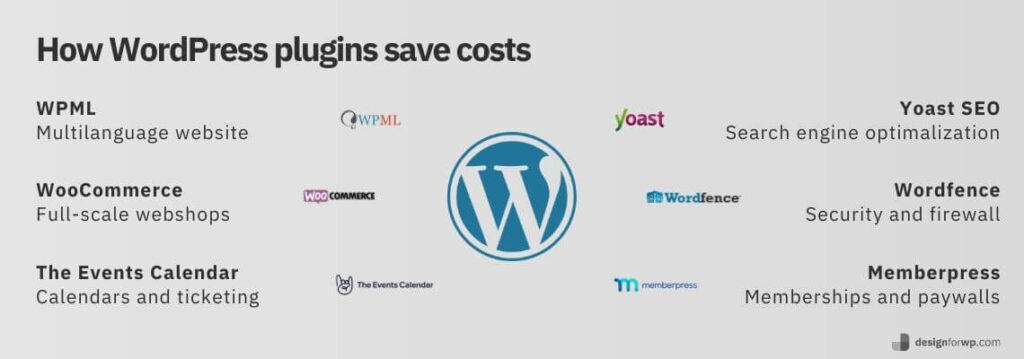
Agencies and Knowledge
Lots of developers and agencies offer services specifically for WordPress websites. WordPress is such a commonly used system – there are tons of experienced developers on the market and knowledge is widely available.
This gives you several benefits. For example:
- It is easy to get any type of support and guidance. There is tons of online documentation. This is massively helpful in case you have trouble managing your website.
- It is easy to find agencies or individual developers. The market is competitive, resulting in more affordable websites.
- If you are looking for specific functionality, there is a high chance that you will find plugins for that. This avoids you from having to build things yourself.
Conclusion
WordPress has been a massive player in the web design industry for many years. It continues to power some of the biggest websites in existence today. WordPress is easy to use and offers flexibility and scalability to meet almost any business or personal need.
Websites can be big in several ways. It could be a large-scale webshop offering tons of products or a highly popular website for an artist or brand. But with the right setup, you can scale up WordPress to process very large websites with high amounts of traffic.
WordPress offers you the flexibility to make changes as you wish and the scalability to meet high demands. If you’re planning on building a big website or scaling up an existing website, WordPress is a solid platform and a good choice.

